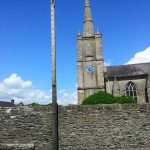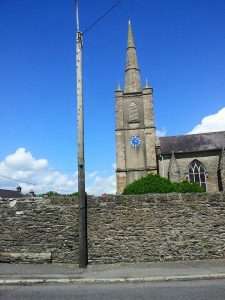Sermon for Sunday, 30th October 2016 (Fourth Sunday before Advent/Ordinary 31)
“he too is a son of Abraham.” Luke 19:9
The word “he” occurs eleven times in the ten verses of the Gospel reading, looking at that word can help us in our thoughts about Jesus and Zacchaeus.
The story begins with “he” applied to Jesus, Saint Luke Chapter 19 Verse 1 says, “He entered Jericho and was passing through it.” Luke captures a sense that this was an opportunity that had to be taken. Jesus comes to the city, but it is the last time he will walk this way, his destination is Jerusalem and the events that would follow. The presence of Jesus along this road is going to be brief, there will not be much time in which to see him or speak to him. The story is about seizing opportunities that will not come again, it is about taking chances when they arise. What does it say about our own response to God? Do we take the opportunities that come to us? Or do we let them pass on down the road as Zacchaeus might have let Jesus pass?
“He was trying to see,” says Verse 3. Zacchaeus wants to see Jesus. We should ask, “why?” We are told that Zacchaeus was a chief tax-collector, that he was rich, Jesus had no money, he had nothing of the things that Zacchaeus had considered to be so important. Making money has been the purpose of Zacchaeus’ life, but he wants to see Jesus. He has realised that Jesus has something that money cannot buy. Zacchaeus’ status in the community depended much on people fearing him, he would have depended on large lieutenants to enforce his demands, for Saint Luke tells us “he was short in stature.” Zacchaeus throws caution aside in his concern to see Jesus, “he ran ahead and climbed a sycamore tree.” Zacchaeus comes to us as a comical figure, one about whom we sing in children’s choruses, but can we imagine how much pride Zacchaeus had to set aside in order to do what he did? Would we be prepared to set aside our pride to pursue our faith? Would we be prepared to risk ridicule and abuse? Would we be unworried by people talking about us? Smiling at the thought of Zacchaeus up a tree, we should ask ourselves where we would have been.
Zacchaeus wishes to encounter Jesus, Zacchaeus knows, in Verse 4, that “he was going to pass that way.” What passes through Zacchaeus’ mind as he waits for that moment that was going to change his life? What was he expecting to happen? Verse 5 says, “When Jesus came to the place, he looked up.” What does Jesus know about this man? What have people told him? Had Zacchaeus reputation gone before him and was Jesus a little amused to see someone who would have been regarded as a “hard” man sitting in the branches of a tree? When Jesus declares his intention to eat at the house of Zacchaeus, how much would Zacchaeus’ mood have changed? When we read of this encounter, is there any part of the story with which we might identify? If we had met Jesus on that road, how would we have felt? Have our own encounters with Jesus been moments that have changed us?
What is Zacchaeus’ response? Verse 6 says, “he hurried down and was happy to welcome him.” There is no moment of hesitation, no questioning, no weighing up whether or not this was a good lifestyle choice? Zacchaeus does not stop to ask what people might think of him? He does not stop to ask what the cost of this decision might be. For those watching, there is no joy in seeing the change that has come into Zacchaeus’ life, instead, in Verse 7, they complain about Jesus, “He has gone to be the guest of one who is a sinner.” The people are cynical about Zacchaeus, they do not believe he has the capacity to change. Zacchaeus knows there are doubts, declaring his intention to give half of is wealth to the poor and to pay a fourfold compensation to anyone he has defrauded. Would we have been similarly cynical about Zacchaeus? Are we cynical about people who undergo a sudden change? What about ourselves, what is our response? Isn’t questioning the sincerity of others a sign of our own insecurity? When we see lives changed, does it ask about our own response?
While the crowd are cynical, Jesus accepts the sincerity of Zacchaeus. They would have grumbled at the thought that Zacchaeus might have been part of God’s plan of salvation, they would have recoiled at Jesus’ words in Verse 9, “he too is a son of Abraham.” One wonders how readily people like Zacchaeus were accepted by the more traditional followers of Jesus in the years that followed. The story challenges us about what sort of people we are, are we always dubious about the sincerity of people? Are we reluctant to include those who are not like ourselves? Have we space for people changed by God’s grace?
“He” is used of Jesus and “he” is used of Zacchaeus. As we read the story and put ourselves in the place of each of them, what does it say to us about taking opportunities, about seeking Jesus, about meeting with him, about responding to him, about accepting the power of God to change our lives?



Comments
Sermon for Sunday, 30th October 2016 (Fourth Sunday before Advent/Ordinary 31) — No Comments
HTML tags allowed in your comment: <a href="" title=""> <abbr title=""> <acronym title=""> <b> <blockquote cite=""> <cite> <code> <del datetime=""> <em> <i> <q cite=""> <s> <strike> <strong>